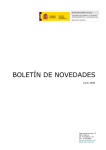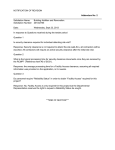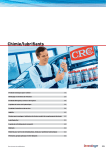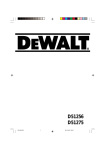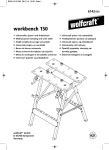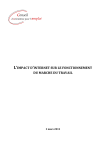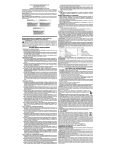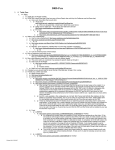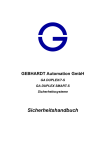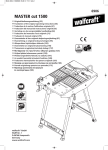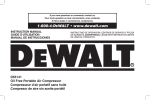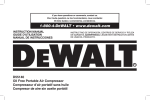Download Workshop User Policy
Transcript
DF L WA T E RL OO| A RCHI T E CT URE D E S I G NF A B R I C A T I O NL A B S US E RGUI DE WATERLOO | ARCHITECTURE DESIGN FABRICATION LABS USER GUIDE DESIGN FABRICATION LABS INTRODUCTION HOURS OF OPERATION EXTENDED HOURS LEVELS OF AUTHORITY GENERAL POLICY PROPERTY DAMAGE & LOSS DELIVERIES MATERIALS AND SUPPLIES TERMS OF USE OCCUPANCY SAFETY REGULATIONS FIRST AID DEMERIT POINT OFFENCES HOUSEKEEPING FIRE / EVACUATION TOOL CHECK OUT DIGITAL FABRICATION (dfab) LASER CUTTER CNC ROUTER 3D PRINTING EQUIPMENT FLOOR PLAN WA | Design Fabrication Labs 2 2 2 3 4 4 4 4 5 6 6 6 8 8 9 9 10 10 11 12 14 15 Policies and Procedures Manual WATERLOO | ARCHITECTURE 1 INTRODUCTION DIGITAL FABRICATION LAB [Dfab] Waterloo Architectures Design & Fabrication Labs (DFL) is a facility that supports experimentation in design and materials, and provides facilities, equipment and space for wide scope of fabrication projects of architectural and landscape models, furniture and 3-D sketches. The shop is equipped with machinery and tools to handle fabrication in wood and wood products, paper products, metal, plastics and poured materials requiring molds (i.e. epoxies, concrete, and plaster). The WA Fabrication Labs is approximately 5000 square feet and located on the ground floor of the School building with easy internal and external access (Rm. 1006). It consists of four primary areas; machine tools, bench/assembly, metalworking and digital fabrication. The Digital Fabrication Lab is a bridge between the digital and the physical and is encouraged to be utilized as an integral component of the design process. The Digital Lab is located within the main adjacent to the main entrance doors in room 1006B. The Dfab has a range of digital equipment consisting of both additive and subtractive processes tools including 3D printing, laser cutting and CNC milling. The Dfab schedule is generally the same as the shop hours and is supervised and managed by the Fabrication Lab Manager. WOOD Lab The largest large portion of the lab has been allocated to wood and processing equipment. Here students have access to a comprehensive joinery shop with a wide variety of hand and power tools. Students are provided with instruction and facilities for prototype and model making, furniture building, and general fabrication techniques. The facility enables and encourages experimentation & exploration of materials and processes of wood and wood product fabrication. The Design Fabrication Labs are supervised by the DFL Manager and a Technician. Access to the equipment is dependent on the availability of one or both of these individuals. Normal working hours for the Fabrication Labs are: Monday Tuesday Wednesday Thursday Friday Saturday Sunday 8:30-5pm 8:30-5pm 8:30-5pm 8:30-5pm 8:30-5pm CLOSED CLOSED Note: METAL Lab Metalworking is an evolving component of the labs and is currently integrated into the Main shop area as the schools looks to expand its metal capabilities. The Metal Lab provides tools, equipment, training, and workspace for small and large-scale projects involving sheet metals and steel structural sections. metal shears, and brakes as well as cutting and bending equipment are available. The Lab allows for a range of fabrication and exploratory work in support of studio and thesis work, research, and design–build projects. ASSEMBLY AREA A large portion of the Lab space is dedicated to the bench/assembly area that provides students ample area to construct, assembly and work on their various works and projects. A wall of windows provides abundant natural light directly to the 16 workbenches in the assembly area. A student tool cabinet is provided to allow students rudimentary tools for after hour work. WA | Design Fabrication Labs HOURS OF OPERATION The shop is closed for lunch, 12:00-1:00 During off-hours when the fabrication labs are not supervised, students still have FOB access to the main shop area, however power to the machines will be off. There is no power tool usage during the lunch hour if the supervisors are not available to monitor the labs. Any changes to the regularly supervised shop hours will be posted on the DFL doors and the DFL twitter feed and posted on the Fabrication SharePoint calendar. Please note that due to unforeseen circumstances, these hours are subject to last minute changes. EXTENDED HOURS If it is determined that there is a tangible need for additional shop access, the DFL will try to make arrangements for a supervisor to be available to provide lab/shop access for special projects and busy deadline periods whenever possible. Policies and Procedures Manual WATERLOO | ARCHITECTURE 2 To help moderate casual or unnecessary requests, the DFL suggests that a faculty member initiate the request on behalf of the class for the extended hours. Requests should ideally be made at least two weeks in advance prior to the required date. To warrant scheduling adjustments, the DFL requires a minimum commitment of 10 students in the lab during the duration of the supervised time. discretion. Individuals or groups violating safety or operational protocol will be reported to the Administration. Individuals violating the rules will have access to the facilities suspended. Administrative Officer: Mona Skuterud Any disputes that cannot be resolved in the Fabrication Labs are to be taken to the Administrative Officer for resolution. Requests made with less than the 2-week notice cannot be guaranteed. Staff schedules cannot always be flexible enough to accommodate short notice requests. If staff cannot satisfy the request, external resources can sometimes be contracted to provide supervision. Costs for external resources are not covered within the DFL budget and will need to be approved and allocated to an appropriate account. For scheduling, please contact: Heinz Koller [email protected] ext. 27659 LEVELS OF AUTHORITY DFL Manager: Heinz Koller The Managers responsibility is to maintain a safe and efficient fabrication facilities and equipment. The manager will ensure that all users have a safe and effective learning environment procedures and rules are being followed in the use of all tools and equipment; provide information on safe procedure, on materials and suppliers; and to maintain and repair equipment. Fabrication Specialist: Dan Jessel Reports to the DFL Manager Has authority as a lab supervisor to ensure safe and proper procedures. Acts as a resource providing information on safe procedures, materials and suppliers. The specialist also serves as a technician responsible for the maintaining the facilities and equipment of the DFL. Security Guards: During the unsupervised off-hours in the Fabrication Labs, the on-duty Security Guard has authority. If Security feels there is any unsafe or inappropriate use of the equipment or facilities, they have the authority to restrict access or close the entire facility at their WA | Design Fabrication Labs Policies and Procedures Manual WATERLOO | ARCHITECTURE 3 arranged with the DFL Manager. Materials and projects left in the Labs without prior notification will be removed without notice. GENERAL POLICY – RULES, REGULATIONS, REQUIREMENTS 1. The DFL staff’s primary responsibility is to ensure the proper and safe use of the tools, machines and equipment of the shop. 2. DFL staff will also provide technical guidance regarding materials, design and fabrication. Some assistance with the fabrication of projects including modest amounts of specialty or high risk machining. During high activity periods, the DFL staff’s availability to assist in individual design and fabrication projects may be extremely limited. 3. The dust collector system is used to remove dust in the Shop. If you are using a power tool that requires dust collection, make sure that the dust collector is TURNED ON and that the individual valve gate if, present is open. After turning the machine off close the dust collector gate valve, if provided. 4. Any breakage of tools, bits & blades shall be reported immediately to a Lab supervisor. 5. Some tools are available to be used outside of the Fabrication Labs. They must be arranged and signed out with the Lab staff. A sign-out sheet is maintained in the DFL office. No tools are to be signed out on an indefinite loan. Tools not signed and removed from the shop will be considered stolen and dealt with accordingly. 6. The DFL tools are for all to use. When tools are taken outside the Labs for personal use, everyone else suffers from the lack of appropriate tools. Be considerate to the others. 7. All tools have their proper place. Be sure they are returned when you are finished using them. Do not leave bits and cutters in the machines, or tools on benches. Return them to their proper place. 8. Clean up is the responsibility of each individual shop user. Clean your area or equipment used immediately after using. Do not leave your mess for someone else to cleanup. It is your responsibility to clean up after yourself. 9. Place all waste in the proper trash bins. 10. Storing of significant amounts of material or very large projects in the DFL must be approved and WA | Design Fabrication Labs 11. Personal & non-academic projects are not allowed in the labs. All work must be academically related. 12. No treated wood can be used or processed in the DFL shop. 13. Used or reclaimed materials are prohibited in the DFL shop. 14. Project and material storage is provided under the benches in the assembly area. Use the lower shelf to safely store your project and materials with your name and date. Materials stored for longer than 20 days will be trashed or become DFL property. 15. Bring your own tape, paper, pencils, fasteners and other consumable supplies for working in the labs. These items are not provided. 16. Shop will be cleaned at the end of each term and all unclaimed items will be removed or become DFL property. Property Damage & Loss: The DFL & Waterloo Architecture will not be responsible for damage or loss of or to your property, including: belongings, projects and materials or your intellectual property. Anyone found responsible for causing intentional damage or loss to DFL and/or School property or that of another student will be prohibited from entering the DFL and may be the subject of legal action. Deliveries: Deliveries can be arranged through the DFL office. If you are expecting a truck delivery please inform the DFL staff so preparations can be made to receive it. Staff will not remove any materials off a truck without prior notification, and the staff will not accept unexpected deliveries. You or an authorized representative must be present to accept large, heavy, or hard to handle materials. Any materials brought in must be placed in racks or other designated storage areas. The DFL is not responsible for any damage or loss to materials. Materials and Supplies: If you didn't buy it or bring it in, it’s not yours. The DFL Policies and Procedures Manual WATERLOO | ARCHITECTURE 4 does not supply building materials for your projects. If you need to source materials, talk to the staff to help determine the best resources for your needs. The shop does have some limited scrap materials available for the taking in the designated scrap areas, but it is best to ask before helping yourself. Academic Use Policy The primary mission of the DFL and its staff is to serve the needs of WA students in pursuing their academic work. Waterloo Architecture (WA) faculty, staff and registered WA students may use the labs during regularly scheduled hours for course related projects. Students not registered in the current term may not use the DFL or its resources. DFL Use for Commercial Gain No commercial, professional or financial gain is to be made by any DFL user as a result of the use of the lab and its resources. Failure to comply with this condition will result in lost of all DFL privileges. UW Faculty of Engineering Non WA Users All University of Waterloo Faculty of Engineering students can be granted access to the facilities and equipment however; priority is given to WA students. As with all WA students, any Faculty of Engineering shop users are required to: Have the required WHMIS training Complete the DFL shop orientation & safety tour, Write the DFL safety test Perform the DFL practical assessment Sign and agree to the terms of the DFL policy acknowledgement form. Formal orientation and training sessions typically only occur a few times a year and usually at the beginning of the term. Students who have satisfied all the above conditions will not be not be granted access to any of the DFL tools or facilities. Arrangements must to be made with the DFL manager to schedule the appropriate training and lab access. By Provincial Law, the fabrication labs are required to abide by the Ontario Health and Safety act. Lab Supervisors have the authority and responsibility to determine whether any such work is permitted. Projects will be evaluated on a case-by-case basis. WA | Design Fabrication Labs Academic Contracted Services-WA DFL Fabrication Services The DFL will often receive requests to work on projects within the School of Architecture and on occasion, external projects. The priority of working on special projects depends on the urgency, difficulty and scope of the project and the feasibility of the DFL and its staff to perform the work. The Fabrication Lab Manager will schedule any such projects into an internal job queue. Many factors can impact these project timelines. Urgency, difficulty, time and space requirements, resource demands etc., will all be considered in determining the priority of such projects. The DFL will make no guarantee to completion dates on any special projects. Students’ demands will dictate allocation of time to special projects. WA staff and faculty requesting work from the DFL for such special projects are required to fill out a DFL Work Request and submit it to the DFL manager. All work will be billed based on time and materials to an appropriate UW account or billed independently. If external services are contracted, they will be billed directly to the unit requesting the project. Overtime hours will be billed at time and a half. Contracted Services- WA Fabrication Services On occasion the DFL will act as a service and do projects on a contract basis. The priority of these projects again, depends on the urgency, difficulty and scope of the project. The DFL manager will add the project to a list of projects. DFL work on special projects will not be done if it interferes with student requirements. The WA has a tiered structure for DFL shop rates: Academic: UWSA: undergraduate Academic: UWSA: graduate Academic: Faculty of Engineering: Tri-Council/NSERC/SSHRC/CIHR Industry Partners (matched funding) Non Engineering Departments External Requests: Non-UW clients Policies and Procedures Manual $15.00/ hr. $15.00/ hr. $15.00/ hr. $25.00/ hr. $25.00/ hr. $45.00/ hr. $60.00 /hr. WATERLOO | ARCHITECTURE 5 DFL OCCUPANCY The primary responsibility of the Fabrication Lab staff is to monitor and ensure the safety of all shop users. The maximum number of users that an individual shop supervisor can effectively monitor is affected by many factors. It shall be each Lab Supervisors responsibility to determine how many users they can effectively monitor under any given circumstances. Generally, each shop technician should be able to monitor 10-20 users. This limit may be adjusted upward or downward at the supervisors’ discretion dependent upon the activities and conditions. At no time will the occupancy of room 1006 be allowed to exceed a maximum of 40 users. Application of this policy will be left to the discretion of Supervisor(s) on duty. Resolution of any disputes regarding the application of this policy shall be the responsibility of the Fabrication Lab Manager in conjunction with the Administration Officer and the Director. Occupancy limits should be considered when assigning projects and deadlines. Notify the Fabrication Lab Manager of anticipated periods of heavy Lab use so appropriate plans can be made to adequately address the anticipated demands. If the fabrication lab occupancy is expected to exceed 40 users as a result of your class, you should make arrangements for additional shop staff to be scheduled 3 weeks prior to the day(s) of expected lab use. SAFETY – GENERAL RULES & REGULATIONS All students taking courses offered by the Faculty of Engineering must have appropriate instruction on The Workplace Hazardous Material Information System (WHMIS). Students must obtain a credit for WHMIS via the on-line training. Those who do not have a WHMIS credit will not be granted access to the Fabrication Lab facilities. DFL SAFETY ORIENTATION New students receive the Fabrication Lab orientation where they are shown the layout of the shop, various tools and equipment, emergency and safety provisions WA | Design Fabrication Labs and their location etc. Demonstrations and explanations are given on specific tools and equipment with a focus is on safety and proper execution. All persons intending on using the fabrication labs must participate in the orientation, pass a written test, undergo a practical assessment and sign off on the Policy Acknowledgement Form. Students who have not completed all the requirements or have not submitted a signed form will be prohibited in using the Fabrication Labs. Graduate students continuing their studies at UW will be required to participate in a safety refresher orientation and sign of on a Grad Policy Acknowledgement Form before being allowed access to the machine tools. No unauthorized person shall use the DFL (Guests are prohibited to use any shop tools or equipment). No children, non-student, non-staff, or non-faculty shall be allowed access to the Fabrication Labs. The DFL is a “Safety First” environment and is managed with that as its priority. FIRST AID In the event of an injury occurring when there is no Lab supervisor, have the injured person lie or sit down in a prone position to avoid collapse and possible concussion, and administer First Aid, while a second student if available, is to locate the Security Guard or other staff member to continue First Aid or coordinate additional help. Contact local emergency by phoning 911 A First Aid cabinet and Eye Wash station are located by the sink at the northwest corner of the Lab Large red Emergency power shut off buttons are located around the shop as shown on the floor plan. If you observe that there is potential for injury to occur an injury on any of the machines has occurred, hit the nearest shut off button immediately. In the event of an injury, inform the shop supervisor immediately. The supervisor will provide appropriate First Aid treatment and arrange for transportation to the Hospital if required. Students should be prepared to assist if necessary. Policies and Procedures Manual WATERLOO | ARCHITECTURE 6 University of Waterloo emergency staff recommend that antiseptics not be used on any wound, since they may cover the wound or require extra clean up by medical staff in the emergency room. Washing in cold water and wiping with sterile wipes provided in the cabinet are the only actions required. All incidents must be reported and the supervisor must complete a University of Waterloo Incident Report with the victim within 24 hours following the injury. Non-injury Accidents In the event near misses or incidents resulting in machine damage, material "kick-back", jamming, or other unsafe events, a meeting is required between the user(s) involved in the accident and the Fabrication Lab Manager before any work may resume. 5. All students using the power equipment must wear safety glasses, goggles or a face shield to protect their eyes. 6. Shoes covering the entire foot must be worn at all times when in the shop. No open heels, toes or sides of the foot will be accepted. Soft-sided shoes or ‘slippers’ are unacceptable. Shoe uppers should provide some protection from falling objects. Students will be prohibited from working in the labs if not appropriately attired. 7. Hair should be tied back. Dangling jewelry should be removed and loose clothing avoided: adjust to keep cuffs, drawstrings out of the way. 8. Ear protection is encouraged but not mandatory. 9. Dust Masks are encouraged when you are cutting or sanding EPS foam, XPS foam, plywood, MDF or particleboard. 10. All materials must be kept off the floor and all tools need to be put away at the end of each work period. GENERAL SAFETY RULES [See DFL Safety Manual for more] All shop users are responsible for reading over the complete DFL SAFETY MANUAL and its rules and procedures. Use of the DFL equipment and facilities is conditional upon agreeing to follow all the rules and procedures outlined in that document. Violation of these policies and procedures will result in the issuing of demerits for violations and potential suspension of some or all DFL privileges. 1. Report ANY and ALL injuries immediately to the DFL staff. All DFL staff are First Aid trained to help with any potential injuries. During off-hours, injuries must be reported immediately to the Security Guard. All WA security guards are first aid trained. 11. Sawdust and scrap material must be cleared away. 12. No treated wood or wood products can be used in the shop areas. 13. Cellphones, iPods and headphones are prohibited when using the machine tools. These items present safety concerns and your complete attention is a requirement in a safety first environment. 14. No spraying of paint or adhesives in the DFL. The spray booth is located in the undergrad studio on the 3rd floor. 15. Use extreme care that all lumber is free from any foreign materials (nails, bolts, metal etc.) before machining. 2. Students must fully co-operate with the shop supervisor(s) and must follow the rules without exception. 16. Keep your work area free of scraps & debris. Clean up immediately after completing any operation at a tool, work area or bench. 3. It is the student's responsibility to receive and understand instruction in the proper and safe use of the tools and equipment before he or she attempts to any operation with the equipment. 17. Make sure you are comfortable with the operation of any tool or piece of equipment. If you are unfamiliar with a particular operation, seek assistance from the DFL staff. 4. Do not enter shop while tired or under the influence (Drugs, Alcohol, and any Medications causing Drowsiness or impaired performance) 18. Report any damaged equipment or strange sounding equipment immediately to the DFL technician. WA | Design Fabrication Labs Policies and Procedures Manual WATERLOO | ARCHITECTURE 7 19. To protect everybody’s health, no grinding/sanding of toxic materials such as concrete, fiberglass or resin is permitted. who has been suspended will need to take the safety tour and test before their DFL privileges are reinstated. 20. All safety guards must be kept in position while machines are being operated. 21. All adjustments are to be checked and secured before the power is turned on. 22. Never make adjustments or repairs to machines. 23. Remove all wrenches and other tools from the machine before turning the power on. HOUSE KEEPING The WA custodians do not clean the DFL equipment or facilities. It is the responsibility of each and every individual using the lab to participate in keeping the labs clean and safe. 24. Have the instructor check special or unfamiliar setups before machining. 1. Each student is personally responsible for clean up and tool return. 25. Shut the power off when you are finished or if you are leaving the machine, never leave the machine running unattended. 2. Each machine and work area should be cleaned immediately after use. Demerits will be issued for lab users failing in their cleanup responsibilities. 26. Materials should never be fed into a machine faster than it will cut or sand. 3. DFL tools are made available for use while in shop. Anyone removing tools or abusing equipment through incorrect use will lose DFL privileges. 27. "HORSEPLAY" is strictly forbidden in the shop or lab. 28. KEEP HANDS AWAY FROM CUTTING AREA. Keep hands away from cutters and the cutting area. Include the safe zone in all your work operations. 4. Anyone purposely damaging property will lose 29. Personal power tools are prohibited in the school. The only exceptions being hand sanders, drills and Dremel tools. 5. Benches will be cleared each morning. Anything not 30. The Shop Supervisors shall have the authority to alter these policies and procedures. 6. Appropriate precautions must be taken when using privileges (i.e. painting of property, x-acto knifing tables, etc.) neatly stored and labeled will be removed without inquiry. materials like paint, concrete and plasters to keep the workspace clean, (use of drop sheets, tarps, etc.) See DFL Best Practices Guidelines. DEMERIT POINT OFFENCES [See DFL Safety Manual for more] 7. If upon completion of a project the shop has not To foster a safety first culture, the DFL has adopted a demerit point system to help improve student behavior and protect against abusers of the lab privileges. Shop users are responsible for understanding the DFL User Policy and following all the safety rules outlined in the DFL Safety Policy. The system is based on the accumulation of “points” per term. The critical point value is 5 and if any one individual receives a total of 5 demerit points in any given term- their Fabrication Lab privileges will be suspended. In addition, if any individual receives 3 infractions of the same offence they will also have their lab privileges suspended. Suspension will last the duration of the term. Once the term is completed the suspension is lifted and the individuals’ demerits are wiped clean. Any individual WA | Design Fabrication Labs been properly cleaned, any further shop access for that class or offending individuals will be suspended until the house keeping has been addressed properly. Demerits will apply. 8. Throw away the small scrap pieces and put the larger usable pieces in the free material storage rack. 9. Pick up the scrap pieces and off-cuts from the machines and dispense with them appropriately. 10. Do not dump plaster or concrete mixtures, paint or Policies and Procedures Manual glue into the sink – these should be emptied into containers, cardboard boxes or garbage bags and disposed of in the appropriate garbage bins WATERLOO | ARCHITECTURE 8 11. Flammable and combustible liquids must be stored in approved flammable cabinets. Keeping the DFL clean and safe is an important priority and students failing in their responsibilities will be reprimanded through a demerit system: • Strikes and you’re out • First & second offense: Warnings • Third offense: Loss of shop privilege for the remainder of the academic term. FIRE Fires are divided into three “classes”. All are potential conditions in the shop. 1. Class A: Fires with ordinary combustible materials, such as wood, rags, and rubbish. Open Access Tools The DFL maintains a tool cabinet providing students round the clock access to common hand tools. These tools have been demarcated with bright orange paint or tape so that can be easily identified and managed accordingly. These tools are intended to available to all the students and should be returned immediately after use. Please do not borrow for extended periods time. The lab does not fund these tools. If tools are not returned or go “missing” they will not be replaced until the beginning of the next term provided funding is available. As these are non-funded assets, any funding for new tools or replacements will need to come from WASA, WEEF or individual donations. Tool Checkout Policy For any fire to start or remain burning, it must have the following three things: The Lab has allocated some tools to be available for checkout. These tools are loaned out for a period of one day, and are due the following morning at 10:00am. A tool checked out on a Friday is due the following Monday at 10:00 am. With the DFL tool inventory being shared among a large number of people, students who need a tool for a prolonged period of time are encouraged to buy their own. Tools must be checked out well in advance of the Lab closing. Tools will not be signed out after 4:30pm. 1. Fuel - Any combustible material. 2. Heat -Enough to raise the fuel to its ignition temp. 3. Oxygen -Necessary to sustain combustion. Tools left in the shop are not “checked in”. Tools must be returned to DFL staff and checked of in the sign out register to be considered returned. If any of the three is missing, a fire cannot be started. With the removal of any one, a fire will be extinguished. Late tool returns will be subject to demerits. Each infraction will result in 1 demerit; three demerits for the same infraction will result in suspension of all DFL privileges. 2. Class B: Fires with flammable liquids, such as gasoline, oil, grease, paints & thinners. 3. Class C: Fires in or near electrical equipment such as motors, switchboards & electrical wiring. Fire Alarm 1. Stop what you are doing 2. Shut off all machinery 3. Leave through nearest emergency exit and go to the parking lot All tools borrowed must be returned in the condition in which it was checked out. A tool lost or damaged, becomes the student’s responsibility for repair or replace. Failure to pay may result in a suspension from all DFL access. The School of Architecture Fire Wardens will instruct you to leave by the nearest exit and remain away from the building. When the shop is not supervised the security guards assume the role of Fire Warden. Wardens will be posted outside of the building to assist you in your exit and to ensure that no one returns to the building. Return to the building only if and when the Wardens have given approval to re-enter. Power tools with cutting blades are prohibited from being checked out and used unsupervised. These tools include jigsaws, circular saws and routers. WA | Design Fabrication Labs Bringing in your own power tools for use in the school is prohibited. University policy prohibits the use of personal power tools in the school and will not be responsible for any unauthorized use of such tools. Cutting tools like jigsaws, circular saws and routers will be confiscated if found in the school. Policies and Procedures Manual WATERLOO | ARCHITECTURE 9 DIGITAL FABRICATION LAB (Dfab) The Lab is located within the main shop adjacent to the main shop doors in room 1006B. The Dfab regular hours coincide with that of the DFL. The Scheduling and supervision for this Lab is managed by the Fabrication Lab Manager. The Fabrication Lab equipment can be in very high demand during the peak deadline periods and machine time will be at a premium. The DFL maintains a strict schedule during these times and anyone who has not prepaid for his or her scheduled use will not have a guaranteed time slot. Anyone missing his or her time slot will be billed for the scheduled time. People who do not complete their cutting in time will be required to stop their job and schedule for the next available time to complete their cutting. Priority of access Priority of access to the dFAB facility is as follows: Specific course offerings, which teach digital fabrication technology • Other course offerings, including studios, which arrange for access on a term-by-term basis. • Faculty research projects • Individual students who have taken the requisite training and wish to use the technology. Priority within this group is established by sign-up on a first-come-first-served basis. LASER CUTTER See Laser User Guide for a complete overview of the Laser Cutter The Dfab maintains 2 ULS machines: 1 - X660 50watt machine 1 - X2660 100watt machine. Both have 457mm x 812mm (18”x32”) cutting beds. Each is equipped with a dedicated workstation capable of processing and sending files from AutoCAD, Rhino, Illustrator or Photoshop. REQUIREMENTS FOR USE: All currently registered UWSA students and faculty are permitted access to the lab and the equipment provided they comply with the following: 1. Complete and pass the Level 1 Laser cutter test 2. Understand and agree to information outlined in the Laser cutter user policy WA | Design Fabrication Labs 3. Sign the User agreement form 4. Pay for the time used on the equipment Training Training is provided through user guides and training tutorials available on line through the Fabrication Labs SharePoint site. All those intending on using the laser cutter must pass the Level 1 test. Passing will require individuals to read the laser cutter user manual, laser cutter safety manual and viewing the on-line tutorials. Individuals passing the test, students will be recognized as a qualified user and will be granted access the digital lab during regular hours (9:00am5:00pm Monday-Friday). A log of certified users list will be kept and maintained the DFL staff. It strongly recommended that students get qualified well in advance of their anticipated cutting times. COST The laser equipment is charged out by the hour: 100watt X2-660 $10.00/hr 50watt X-600 $8.00/hr All laser bookings must be pre-paid before entering the Lab. Agreement You must agree to pay the use charges, to take responsibility for the machine during your work session and to follow all rules governing safe use. You must also agree to accepting liability in the event the you the user contributes to any damage, defacement or loss of property due to the negligence of that user, the School of Architecture and the DFL shall assess all costs and expenses, direct and indirect, incurred in replacing, repairing or correcting such damage or defacement, or any portion thereof, against the student. Dfab HOURS OF AVAILABILITY Access and supervision of the Digital Fabrication Lab will be provided during regular DFL hours 9:00am5:00pm pending availability of DFL staff or other qualified supervisor. Off-hour access for any Level one user may be arranged with a qualified student Lab supervisor. Student supervisors are selected each term to provide additional access to the lab and the laser cutters. They provide their service as a courtesy to you and are not under any formal obligation to do so. If making arrangements for off-hour supervision, plan in advance and make arrangements with an available supervisor prior to Policies and Procedures Manual WATERLOO | ARCHITECTURE 10 booking time with the DFL staff. Supervisors can be contacted via the contact information listed on the posting on the Dfab door. Cost: Off-Hour Supervised Laser Cutting 100watt 50watt X2-660 X-600 $15.00/hr $12.00/hr All laser bookings must be pre-paid before 4:00pm the day of the booking. Weekend times must be prepaid by 4:00pm Friday afternoon. Time may be reserved in advance to a daily maximum of two hours. You may extend your cutting time beyond the 2 hour limit only if there are no other bookings upon completion of your session. Scheduling Laser Times: The laser fabrication schedule maintained at the by the staff in the DFL office. The fabrication scheduled is available for review on-line but bookings must be made through the Dfab staff: Heinz Koller: ext. 27659 Dan Jessel: ext. 27646 Laser cutter reservations are non-transferable; the individual listed on the reservation must be present during the operation of the laser cutter during their scheduled time. This applies to group projects. The individual listed on the booking is the person who is officially responsible for the laser cutter during that scheduled time. If you no longer require your reserved time, contact the DFL staff ASAP to release it and make it available for the use of others. Cancellations with less than 24hrs notice may not be credited laser time. No-shows will be billed for the scheduled time. Scheduled time not paid for will result in the suspension of all DFL privileges. CNC Router: See the CNC FAQ or the CNC user guide for a complete overview The Techno CNC Router is an industrial tool capable of routing and milling complex geometries in both 2 and 3 axes. The router has a working envelop of 1475mm x 1220mm (58” x 48”). Gantry clearance in the Z-axis machining is limited to 8” providing full height machining to a maximum of 100mm (4”). The machine is equipped with manual tool change tool holder. Extremely accurate and complex shapes can be made in WA | Design Fabrication Labs a relatively streamlined manner. 2D and 3D shapes constructed digitally can be processed through VisualMill and RhinoCam to produce Numerically Controlled (NC) cut files that are sent directly to the machine tool. Prototypes, models, contours and full-size building components can be machined through this subtractive process from wood solids, composite wood products, plastics, modeling and structural foams. Cutting of any metals is prohibited. Note that undercuts are not possible with single sided machining. Priority of access to the CNC equipment is established as follows: • Specific courses teaching CNC or digital technology • Other course offerings, including studios, which arrange for access on a term-by-term basis. • Faculty research projects • Individual students. Priority within this group is established by sign-up on a first-come-first-served basis. Access to the CNC router is scheduled by sign-up in the DFL office upon review of a completed digital file. Priority is on a first come, first serve basis. Times are scheduled from Monday-Friday based on the availability of machine and DFL staff. Please provide as much advance notice as possible prior to your anticipated use when scheduling CNC time. The DFL staff needs to schedule their time accordingly and short-notice bookings may not always be possible. Due to the nature of CNC programming, set-up and machining, time slots are issued based on efficiency allowing the maximum of users in any given day. More intensive projects can be multi-day sessions and due to the nature of the milling process, once a project is begun, it is preferable that it is completed in its entirety. If bookings need to be cancelled, please notify the DFL staff ASAP. Staff and students schedule their time based on the demand and availability of the tools. Please be considerate. Short notice cancellations or cancellations during peak busy periods will be charged the CNC minimum charge. Users who cancel CNC time will be prohibited from using the equipment in the future until the fee has been paid. It is highly recommended that new users discuss their projects with the DFL staff to familiarize themselves with file requirements, material recommendations, time allocation etc. A review of the CAD file is required before Policies and Procedures Manual WATERLOO | ARCHITECTURE 11 any CNC time slot is confirmed. Please contact the staff in the DFL office room 1006B Dan Jessel Email: [email protected] Phone: ext. 27646 Access to any damaged machine will be suspended until the machine has been fixed and brought back on line, as determined by the DFL Manager. Heinz Koller Email: [email protected] Phone: ext. 27659 CNC Fees WA users will be charged an hourly rate to use the CNC equipment. Minimum charges will apply to any projects taking less than 2hrs. The hourly charges are material dependent. Foam: Other: Min. Charge $5.00/hr. $8.00/hr. $10.00 Tooling Charges If specialty tooling or equipment is required for any given project, the additional costs will be added to the fee. Users may choose to purchase their own tooling and cutters, in which case they would not incur any of the additional charges. User Expectations: It is an expectation that all those intending to use the equipment must be involved in the entire process from file set up, CNC programming and CNC set-up & machining. The student is expected to participate from beginning to end. When the CNC router is actively in operation, the user must be present and attentive at all times. Users will not leave the room with the machines running, even for a moment. If one needs to leave, the machine must be paused or stopped. Upon completion the user is expected to thoroughly clean the CNC and surrounding area. All tools are to be returned to their proper location, CNC bed vacuumed and the floor swept. (see CNC house keeping guideline) No machine – computer or fabrication - will be reconfigured or otherwise modified by users beyond that which is part of the normal operation of such machine. This includes any hardware and/or software(s) used to build objects or to drive the fabrication process. WA | Design Fabrication Labs In the event of any problems or difficulties with the operation or maintenance of the machines, all work on such machine will cease, and the DFL Manager or Technician must be notified immediately. Users can only operate the equipment in presence of a qualified supervisor. (DFL staff or other appointed Faculty or student) Eye protection is mandatory when operating the CNC. 3D PRINTING: See 3D printing user guide for a complete overview The Dimension 1200es 3D printer allows students to create objects from ABS plastic using an additive manufacturing process. Objects are built up in a succession of layers from the bottom up. The Dimension build envelope measures 254 x 254 x 305 mm (10 x 10 x 12 in) 3D Printing Fees Fees are charged to cover cost of consumables. Printer charges are based on volume of the printed model. Volume calculations and cost estimates can be provided prior to running jobs by processing an STL file of the model to be 3D printed. Because printing costs are based on volume, modeling strategies can impact part cost and grow time. Review your models with the DFL staff prior to printing. Complete part failures due entirely to Lab error will not be billed. REQUIREMENTS FOR USE: 1. The Dimension 3D printer requires a general knowledge base to understand how the equipment works and perhaps more importantly how to model appropriately for the limitations of the technology. You must be approved to use the printer and ancillary tools independently. Tutorials and training are available to all UWSA students. 2. The processed. A file with errors or problems has the potential of building problematic parts. The Lab Manager is not required to modify or edit CAD Policies and Procedures Manual WATERLOO | ARCHITECTURE 12 files. 3. Students may not operate the 3D printer without the guidance of trained personnel. Unauthorized use of the 3D printing equipment will result in immediate suspension of Lab privileges. 4. The user is required to monitor the build process as issues can arise. Regular and periodic checks are required throughout the build process. The dfab will not be responsible for bad parts or damage to the equipment. 5. Parts must be removed from the platen and placed in the bath to remove support material. Extreme care must be taken when working with the cleaning station, as the solution is extremely corrosive. [Refer to the cleaning station SOP] 6. In the event of any problems or difficulties with the operation or maintenance of the machines, all work the machine will cease, and the Lab manager must be notified immediately. 7. Access to any damaged machine will be suspended until the machine has been fixed, as determined by the Fabrication Lab Manager. WA | Design Fabrication Labs Policies and Procedures Manual WATERLOO | ARCHITECTURE 13 Trim Router Belt Sanders: Dewalt variable speed DW433 (2) Palm Sanders Power Planer: Dewalt DW680 Finish Nailer: DeWalt D51275 Brad Nailer: DeWalt D51236 Compressor DeWalt D55140 Compressor DeWalt D55141 Plate Joiner: Dewalt DW682 LIST OF AVAILABLE EQUIPMENT Hand Tools: Wrenches & Socket Sets: inch & metric Wire Cutters & Strippers Riveters Pliers & Vise Grips Scales & Rules Tri Square Combination Square Sets Protractors Screwdrivers Allen Key Sets Hammers & Mallets Hand Files, Rasps & Sure-Forms Drills Router Bits Sheet Metal Snips Tape Measures Thread Pitch Gages Wire Brushes Ball Peen Hammer Claw Hammer Multi-tester Digital Angle finder Dowel Jig: Wolfcraft model 4641 Cross Slide Vise Miter-Trimmer Power Tools: Orbital Sander: DeWalt DW421 Cordless Drill Driver : DeWalt 18V (2) Cordless Drill Driver : Mastercraft 18V (2) Cordless Drill Driver : Mastercraft 14V (2) Cordless Drill Driver: Makita 1/2 18V LI-ION BDF452H Hammer Drill: Bosch Flex Shaft: Foredom Model SI-23A Soldering Iron Router: Dewalt Dremel: Rotary tool & accessory kit Drill Bit Sharpener: Drill Doctor Model Engraver: Dremel Model 290-01 Electric Drill: DeWalt Angle Grinder / Sander: DeWalt DW402 Rotary Tool: Mastercraft Cordless Reciprocating Saw: Mastercraft 18V Heat Gun Cordless Drill /driver: DeWalt DC759 Jigsaw: orbital DeWalt DW318 Hand Power Planer: DeWalt Plunge Router: 2hp DeWalt DW621 Fixed Base Router Circular Saw: 8 ¼” HD DeWalt DW384 WA | Design Fabrication Labs Woodworking: Radial Arm Saw: 14” General V-154 10” Table Saw: DeWalt DW746 12” Disk 6” Belt Sander: Delta AFM-20-1 Router Table: Veritas 20” Band Saw: Powermatic model 81 Wood Lathe: Rockwell 12” gap bed Jointer 6”: Rockwell 37-22 13” Planner: Delta Model DC-33 Scroll Saw: DeWalt Hollow Chisel Mortiser: Delta14-650C Compound Miter Saw: 12” DeWalt DW705 Drill Press: Delta 17-925 Bandsaw 10”: Craftsman Table workshop: Hegner MK4 (2) Panel Saw: SSC 1” Belt/8” Disc Sander” Delta SA180 Edge Belt Sander: Progress PMC-150 Vacuum Press: Mercury MVP50 Vacuum Bag: 20MIL 2’x4’ Vacuum Bag: 20MIL 4’x6’ Oscillating Spindle Sander: Delta Model 31-780C Plastic Working: Disc Sander: 12” Hot Wire Foam Cutter: Demand Model Hot Wire Foam Cutter: Demand Multi-Cut Model EMX-2 Stripheater: Metalworking: Bandsaw: 15” General Model 590 Milling/Drilling Machine: General Model 75-880 Horizontal Bandsaw: General Model 735-m40 Abrasive Cut-Off Saw: Milwaukee Bench Grinder: DeWalt Metal Shear: Tennsmith Brake: 24” Metal Notcher: 18 Gauge: Tennsmith Model 16 Groz Metal Bender 12” Disc Sander Bench top sand blasting cabinet Welding: Lincoln 225 Precision TIG Welder Policies and Procedures Manual WATERLOO | ARCHITECTURE 14 WATERLOO ARCHITECTURE | FABRICATION LABS WOOD WORKING WOODWORKING STORAGE DIGITAL FABRICATION W1 14” Table saw W20 4” Table saw S1 Wood hand toos D1 100W Laser cutter W2 10” Table saw W21 4” Table saw S2 Materials storage D2 50W Laser cutter W3 13 Planer W22 Edge sander S3 Clamp Rack D3 ZCorp 3D Printer W4 6” Jointer W23 Down draft table(2) S4 Tool Cabinets D4 Depowdering unit W5 12” Wood Lathe S5 Student Tool Cabinet D5 FDM 2000 3D printer W6 20” Bandsaw METAL WORKING S6 Paint/flammables D6 CNC Router W7 14: Radial Arm Saw M1 52” foot shear S7 Metal misc.storage D7 CAM Workstation W8 Compound Miter Saw M2 Bench grinder S8 Tool cabinet D8 Laser Workstation W9 Panel Saw M3 Cut-off saw S9 Metalwork tools D9 Laser workstation W10 Router table M4 12” Disc sander S10 Power tool cabinet D10 3D print workstation W11 Spindle sander M5 15” Bandsaw S11 Scraps materials W12 10” Bandsaw M6 24” Brake W13 6” Belt/disc sander M7 Notcher W14 Mortiser EMERGENCY SERVICES First aid Emergency shut-off Emergency exit Fire extinguisher W15 1”belt/disc sander ASSEMBLY W16 16”Drill press A1 30”X72” Work bench W17 16”Drill pess A2 34”X72” finishing bench W18 Drill/mill machine A3 36”X84” assembly table W19 Scroll saw A4 36”X84” assembly table WA | Fabrication Labs Policies and Procedures Manual Eye-wash station Telephone 15 Shop Rules We Live by... If it’s not yours, leave it If you make a mess, clean it If you borrow it, return it If you lose it, replace it If you move it, put it back If you open it, close it If you turn it on, turn it off If you break it, repair it If you can’t repair it, replace it If you unlock it, lock it If you don’t know, ask If You Don’t Like It...Find Somewhere Else to Work WA | Design & Fabrication Labs POLICY ACKNOWLEDGEMENT FORM The WA Design Fabrication Labs requires all users to meet the following requirements. • Have completed the WHMIS training • Read the DFL User Guide • Read the DFL Safety Manual • Taken the Fabrication Lab Safety Orientation • Passed the Fabrication Lab Safety Quiz • Complete the Fabrication Lab Safety Practical Assessment All requirements must be signed off that they have been completed before access will be granted the DFL facilities and equipment. ACKNOWLEDGEMENT OF REQUIREMENTS: All completed requirements must be initialed Initials 1. I confirm that I have read and understand the DFL User Guide _______ 2. I confirm that I have read and understand the DFL Safety Manual _______ 3. I confirm that I have completed the WHMIS training _______ 4. I confirm that I have completed Fabrication Lab Safety Orientation _______ 5. I confirm that I have completed Fabrication Lab Safety Quiz _______ 6. I confirm that I have completed Fabrication Lab Safety Practical assessment _______ 7. I confirm I have attended the Fabrication Lab Safety Orientation that demonstrates safe and proper shop, machinery and tool practice. I understand the inherent risks of shop activity and I consent to exposure to these risks. In the interests of shop safety, I agree to comply with the requirements of the DFL and the DFL Supervisors POLICY Print Name ___________________________________________ Signature ___________________________________________ Date ___________________________________________ Student Number ___________________________________________ Email ___________________________________________ Phone: ___________________________________________ DFL Supervisor Signature ___________________________________________ WATERLOO | ARCHITECTURE 17





















